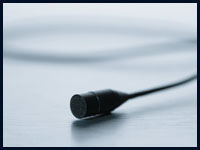DPA Microphones’ 4071-BM
The professional video industry's #1 source for news, trends and product and tech information. Sign up below.
You are now subscribed
Your newsletter sign-up was successful
These days, every time you change the channel, there is a new reality-based show on your television. The production companies producing these programs rely heavily on their microphones to capture each and every sound bite, even in the noisiest and most acoustically challenging spaces. Many of the microphone applications require small, non-obtrusive microphones that are highly resistant to moisture, extreme temperature change and humidity. I’ve had the opportunity to review the 4071-BM miniature microphone with presence boost from DPA Microphones, and it survived my tests.

The 4071-BM miniature microphone features a fixed microphone grid with a soft pressure boost of typically 5dB at 4kHz to 6kHz.
The first challenge for the microphone was shooting a pilot in a bowling alley. The sound of bowling balls slamming into pins and bursts of cheers from bowlers and spectators filled the room. Two female bowlers were fitted with microphones. Bowler A was fitted with a Sony lavalier microphone, and Bowler B was fitted with the DPA 4071-BM. Both microphones were transmitting through a Sony 820 wireless system and being recorded at 48kHz directly to a hard disk Deva digital recorder.
After listening to the recordings, recordings from Bowler B sounded natural and unforced. The speech was clear and intelligible, with a peak at about 5kHz, yet still sounded open to the ambient background sounds. The biggest difference between the two microphones was in the low end and overall headroom. Bowler A had a consistent low rumble that made the recording slightly muddy. That microphone also clipped a couple times, resulting in a much smaller dynamic range. DPA’s microphone has a maximum sound pressure level (SPL) of 144dB before clipping, a large range for any body-worn microphone.
The microphone’s second challenge was in a park in a large, open valley. The head wrangler, Chad Lammers, was fitted with the microphone. The winds were whipping through the valley at high speeds, so you can imagine that the low-end buffeting would be a big problem. The microphone was placed just under Lammers’ collar and then he was fitted with the DPA Miniature Windjammer DUA0571, the buffeting wind was cut down significantly.
The microphone is omnidirectional, which inherently cuts down wind and pop noise, keeping the proximity effect on the low side. These characteristics helped greatly in reproducing a clear, intelligible recording. Though there was some evidence of low wind rumble in the recording, it did not cause any problems later in the mix session. Another helpful feature is the fixed soft boost grid, which gives the microphone a 5dB boost between 4kHz to 6kHz. It is between that frequency range where the presence in a human voice is most apparent. When we were filming Lammers in action, the microphone performed well under harsh conditions.
The third challenge was at the same park, but this time the scene was inside a teepee during a prayer sequence with Rosalie “Little Thunder.” Rosalie was wearing the microphone directly in the center of her chest under her clothing. The film crew was also using a Schoeps shotgun microphone hooked to a boom pole. The Schoeps microphone would pick up the participants from overhead as they took part in the prayer. Both the Schoeps and 4071-BM microphones were connected to a Shure mixer, where their respective signals were sent to separate channels on the Sony high-definition camera.
The professional video industry's #1 source for news, trends and product and tech information. Sign up below.
With Rosalie’s microphone placement, you would expect a slightly muddy sound due to sound reflections off the chest cavity. However, DPA has a nifty adapter called the DAD6024, which connects directly to the 4071-BM and turns around to a standard XLR male connector. This adapter attenuates the frequency area around 800Hz by 3dB to 4dB. When we returned to the studio and played back our recording, we were pleasantly surprised with the quality of the recording and how it blended with the ambient background recorded by the Schoeps microphone.
The DPA 4071-BM microphone, DAD6024 adapter and DAK4071-F accessory kit for miniature microphones come in handy for any audio field recordist, whether in the studio during a live performance, or filming in the field.
Rob Fritts is senior sound designer/mixer for Henninger Digital Audio.
